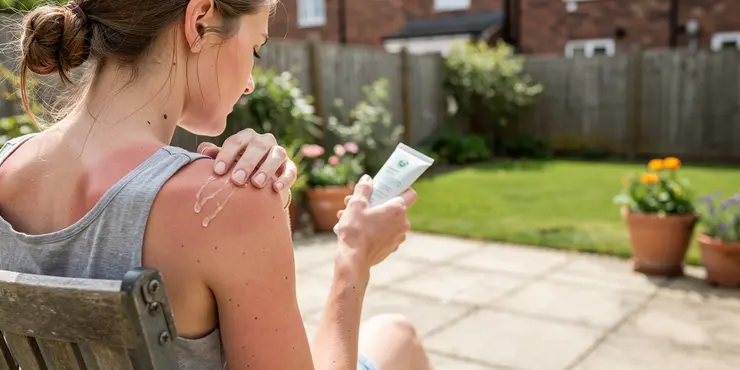
Find Help
More Items From Ergsy search
-

How important is it to keep the skin moisturised with psoriasis?
Relevance: 100%
-

How to treat psoriasis
Relevance: 75%
-

Is there a cure for psoriasis?
Relevance: 72%
-
Is it true that sunbeds can help treat skin conditions like psoriasis?
Relevance: 69%
-

What are topical treatments for psoriasis?
Relevance: 69%
-

Treating scalp psoriasis
Relevance: 69%
-

Are there home remedies for psoriasis?
Relevance: 69%
-

How is psoriasis diagnosed?
Relevance: 65%
-

What is psoriasis?
Relevance: 64%
-

What causes psoriasis?
Relevance: 64%
-

Psoriasis | NHS
Relevance: 63%
-
What role do lifestyle changes play in managing psoriasis?
Relevance: 62%
-

When should I see a doctor for psoriasis?
Relevance: 57%
-

Can diet affect psoriasis?
Relevance: 57%
-

What are systemic medications for psoriasis?
Relevance: 56%
-

What treatment options are available for psoriasis?
Relevance: 56%
-

Can stress trigger psoriasis flare-ups?
Relevance: 55%
-

Can phototherapy help with psoriasis?
Relevance: 42%
-
Do sunbeds help improve skin tone and texture?
Relevance: 41%
-

Can over-the-counter treatments help with psoriasis?
Relevance: 40%
-

Skin cancer education
Relevance: 38%
-

Skin Cancer - How do I check if my mole is skin cancer? | NHS
Relevance: 37%
-

What is a skin cancer screening?
Relevance: 36%
-

Are skin lightening kist safe to use?
Relevance: 34%
-
Do sunbeds offer any anti-aging benefits for the skin?
Relevance: 32%
-

Eczema - Your child's appointment | Dermatology | Paediatrics
Relevance: 32%
-

Hives - Skin Condition
Relevance: 32%
-

How to apply wet wraps
Relevance: 32%
-

How to use topical steroids
Relevance: 32%
-

What SPF should I use if I have sensitive skin?
Relevance: 31%
-

Are skin rashes a side effect of weight loss drugs?
Relevance: 31%
-
Is pre-tanning in a sunbed a good way to prepare my skin for sun exposure?
Relevance: 29%
-

Steroid cream see Topical corticosteroids
Relevance: 25%
-
Are there any health benefits to tanning on sunbeds?
Relevance: 23%
-

Self care - sunburn
Relevance: 23%
-

How can eczema be diagnosed?
Relevance: 23%
-

What SPF is recommended for fair skin?
Relevance: 20%
-

Can methanol be absorbed through the skin?
Relevance: 20%
-

What are some common conditions treated with homeopathy?
Relevance: 20%
-

Is peeling a normal part of sunburn recovery?
Relevance: 20%
Understanding Psoriasis
Psoriasis is a chronic skin condition characterized by red, itchy, and scaly patches. It affects about 2% of people in the UK. The condition results from an accelerated skin cell production process, causing the skin to develop patches of thickened, scaly areas. Managing psoriasis requires a multifaceted approach, among which keeping the skin moisturised is crucial.
The Importance of Moisturising with Psoriasis
For individuals living with psoriasis, maintaining skin moisture is vital. Psoriasis leads to dry, cracked skin, which not only exacerbates discomfort but also increases the risk of infection. A well-moisturised skin barrier is more resilient and better equipped to defend against these threats.
Proper hydration of the skin can help reduce the severity of psoriasis symptoms. Moisturisers provide a protective layer over the skin, locking in moisture and inhibiting further water loss. This helps in soothing the skin and can ease the irritation and itchiness associated with psoriasis. Moreover, well-hydrated skin can facilitate the healing of psoriatic lesions, helping to restore the skin's natural texture more quickly.
Choosing the Right Moisturiser
When managing psoriasis, selecting the appropriate moisturiser is essential. Products free from fragrances and dyes are recommended to avoid potential irritants that could worsen the condition. Look for thick, emollient creams or ointments that are formulated specifically for dry and sensitive skin.
Some moisturisers contain active ingredients like glycerin, lactic acid, or urea, which can enhance hydration and aid in gentle exfoliation of scaly areas. It's crucial for psoriasis users to select products that are reputable and designed to treat their skin condition effectively.
Incorporating Moisturising into Daily Routine
Consistency is key when it comes to skin care for psoriasis. Applying moisturiser immediately after bathing, while the skin is still damp, optimizes the moisture retention capacity of the skin. Moisturising several times a day can also be beneficial to manage exacerbations, particularly during drier months.
Pairing your moisturiser with other prescribed psoriasis treatments can improve outcomes. However, always consult with a dermatologist to tailor a treatment regime suited to your condition and lifestyle.
Conclusion
Keeping the skin moisturised plays an indispensable role in the management of psoriasis. It can alleviate symptoms, protect the skin from infections, and contribute to an overall improved quality of life. Investing in suitable emollients and incorporating regular moisturising into your daily skincare routine can help those with psoriasis manage their condition more effectively. As always, working closely with a healthcare provider to ensure a comprehensive approach to treatment is advisable.
Understanding Psoriasis
Psoriasis is a skin problem that lasts a long time. It makes red, itchy, and scaly spots on the skin. About 2 out of every 100 people in the UK have it. Psoriasis happens because skin cells grow too fast. This causes thick, scaly patches. Taking care of psoriasis means doing several things. One of the most important is to keep the skin wet with moisturiser.
The Importance of Moisturising with Psoriasis
If you have psoriasis, keeping your skin moist is very important. Psoriasis makes your skin dry and cracked. This can hurt and make it easier for germs to cause infections. When skin is moist, it is better at stopping germs.
Keeping your skin hydrated, or filled with water, can make psoriasis less severe. Moisturisers create a protective shield on your skin. They keep water in and stop it from drying out. This makes your skin feel better and can help stop the itching and irritation from psoriasis. Also, when your skin is moist, it can heal faster.
Choosing the Right Moisturiser
Picking the right moisturiser for psoriasis is important. It is good to choose products without strong smells or colors that could irritate your skin. Look for thick creams or ointments made for dry and sensitive skin.
Some moisturisers have special ingredients like glycerin, lactic acid, or urea. These help keep the skin wet and gently remove scales. Choose products that are known to help with psoriasis.
Incorporating Moisturising into Daily Routine
It is important to use moisturiser regularly if you have psoriasis. The best time to put on moisturiser is right after a bath or shower when your skin is still damp. Using moisturiser several times a day is helpful, especially when the weather is dry.
Using moisturisers with other psoriasis treatments can help. But always talk to a skin doctor, or dermatologist, to make sure you are using the right treatments for you.
Conclusion
Keeping your skin moist is very important for managing psoriasis. It helps with symptoms, protects against infections, and can make you feel better. Use good moisturisers and make it a part of your daily routine. This can help you take better care of your psoriasis. Always work with a doctor to make sure you have the best plan for your skin.
Frequently Asked Questions
Useful Links
This website offers general information and is not a substitute for professional advice.
Always seek guidance from qualified professionals.
If you have any medical concerns or need urgent help, contact a healthcare professional or emergency services immediately.
Some of this content was generated with AI assistance. We’ve done our best to keep it accurate, helpful, and human-friendly.
- Ergsy carfully checks the information in the videos we provide here.
- Videos shown by Youtube after a video has completed, have NOT been reviewed by ERGSY.
- To view, click the arrow in centre of video.
- Most of the videos you find here will have subtitles and/or closed captions available.
- You may need to turn these on, and choose your preferred language.
- Go to the video you'd like to watch.
- If closed captions (CC) are available, settings will be visible on the bottom right of the video player.
- To turn on Captions, click settings .
- To turn off Captions, click settings again.
More Items From Ergsy search
-

How important is it to keep the skin moisturised with psoriasis?
Relevance: 100%
-

How to treat psoriasis
Relevance: 75%
-

Is there a cure for psoriasis?
Relevance: 72%
-
Is it true that sunbeds can help treat skin conditions like psoriasis?
Relevance: 69%
-

What are topical treatments for psoriasis?
Relevance: 69%
-

Treating scalp psoriasis
Relevance: 69%
-

Are there home remedies for psoriasis?
Relevance: 69%
-

How is psoriasis diagnosed?
Relevance: 65%
-

What is psoriasis?
Relevance: 64%
-

What causes psoriasis?
Relevance: 64%
-

Psoriasis | NHS
Relevance: 63%
-
What role do lifestyle changes play in managing psoriasis?
Relevance: 62%
-

When should I see a doctor for psoriasis?
Relevance: 57%
-

Can diet affect psoriasis?
Relevance: 57%
-

What are systemic medications for psoriasis?
Relevance: 56%
-

What treatment options are available for psoriasis?
Relevance: 56%
-

Can stress trigger psoriasis flare-ups?
Relevance: 55%
-

Can phototherapy help with psoriasis?
Relevance: 42%
-
Do sunbeds help improve skin tone and texture?
Relevance: 41%
-

Can over-the-counter treatments help with psoriasis?
Relevance: 40%
-

Skin cancer education
Relevance: 38%
-

Skin Cancer - How do I check if my mole is skin cancer? | NHS
Relevance: 37%
-

What is a skin cancer screening?
Relevance: 36%
-

Are skin lightening kist safe to use?
Relevance: 34%
-
Do sunbeds offer any anti-aging benefits for the skin?
Relevance: 32%
-

Eczema - Your child's appointment | Dermatology | Paediatrics
Relevance: 32%
-

Hives - Skin Condition
Relevance: 32%
-

How to apply wet wraps
Relevance: 32%
-

How to use topical steroids
Relevance: 32%
-

What SPF should I use if I have sensitive skin?
Relevance: 31%
-

Are skin rashes a side effect of weight loss drugs?
Relevance: 31%
-
Is pre-tanning in a sunbed a good way to prepare my skin for sun exposure?
Relevance: 29%
-

Steroid cream see Topical corticosteroids
Relevance: 25%
-
Are there any health benefits to tanning on sunbeds?
Relevance: 23%
-

Self care - sunburn
Relevance: 23%
-

How can eczema be diagnosed?
Relevance: 23%
-

What SPF is recommended for fair skin?
Relevance: 20%
-

Can methanol be absorbed through the skin?
Relevance: 20%
-

What are some common conditions treated with homeopathy?
Relevance: 20%
-

Is peeling a normal part of sunburn recovery?
Relevance: 20%


